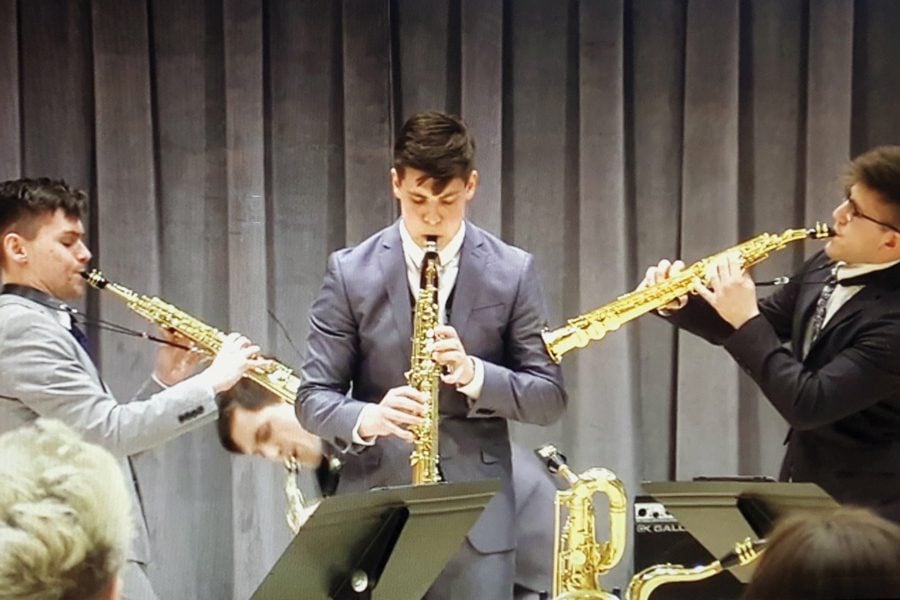Saxophone quartet makes noise at M-Prize Competition, takes home second prize
~Nois performs at the M-Prize International Chamber Arts Competition in May. The group won second place in the open division.
May 24, 2018
A&E
When they were looking for a short and sweet name for their saxophone quartet in fall 2016, the men of ~Nois decided to shorten the word “Illinois” to solidify their status as a Chicago-based group. As the group thought about it more, Bienen Ph.D. student Brandon Quarles said they agreed the concept of “approximately noise” also suited their contemporary style.
~Nois, a saxophone quartet comprised of Bienen masters and Ph.D. students, showcased its “experimental” music in the open division of the 2018 M-Prize International Chamber Arts Competition this May. At the close of the competition, the group — made up of Quarles, Jordan Lulloff, Hunter Bockes and János Csontos — won the second prize for the division.
Quarles said the open division of the M-Prize includes small ensembles of any instrumental makeup. The category attracts a wide range of competitors, he said, like a string quartet that uses a banjo and mandolin, a saxophone-accordion duo and a jazz quintet that plays original music.
Because of the all-encompassing nature of the open division, Lulloff said the M-Prize was the first competition where he felt ~Nois could perform without any creative constraints.
“I truly felt like we could express ourselves and our group identity to its fullest without having to make concessions for guidelines in the competition or for what we would expect the judge to like,” Lulloff said. “If we were going to play some of our more contemporary repertoire and we were in the wind division, that might not fly as well because it wouldn’t be traditional competition repertoire.”
~Nois’ experimental repertoire features music that is the product of direct collaboration with composers, including some pieces that feature improvisation, Quarles said. At the M-Prize competition, ~Nois performed multiple works including Pauline Oliveros’ “Thirteen Changes,” which used a text score as inspiration for saxophone improvisation, he said.
Bienen Prof. Taimur Sullivan, who coaches the quartet, said ~Nois’ work ethic, artistic values and pure musical skill distinguish the group from other contemporary ensembles. Aside from placing second in the M-Prize competition, ~Nois also took home a silver medal in the Fischoff National Chamber Music Competition last year, Sullivan said.
Sullivan said the quartet’s ability to hold its own in both the Fischoff and M-Prize competitions is a hallmark of the group’s stylistic versatility.
“At the M-Prize, they were able to show this ability to cross over in other types of playing, and (introduced) improvisation, choreography, nonstandard ways of playing and nonstandard ways of thinking of what a saxophone quartet is,” Sullivan said. “(They managed to) do that with the same kind of virtuosity and incredible artistry that they displayed prior at Fischoff.”
This summer, the quartet will participate in a fellowship at Blackbird Creative Lab, a workshop for nationally acclaimed performers and composers. Sullivan said the program’s emphasis on performer-composer collaboration speaks directly to ~Nois’ group ethos.
Quarles said the ~Nois members make it their mission to work closely with composers to “push the boundaries of what the saxophone is capable of.” The group will work directly with composers at Blackbird Creative Lab in June and at its University of Chicago residence in the 2018-19 season.
Csontos said he values collaboration with living composers because he is able to ask questions and workshop the composition with its creator, a privilege that he does not have when playing classical work.
“Working with composers, it’s never a piece that is set in stone,” Csontos said. “I enjoy the idea of a piece of music being something that can always change and be something different, as long as the composer wants it to be that way.”
Email: [email protected]
Twitter: @amichelson18


